Waters of Life
How the Jameel Family is working towards the shared ambitions of the UN’s Sustainable Development Goal 6 – clean water and sanitation
![]() Water flows – quite literally – through every area of the global economy. Not only is it essential for business, commerce and industry, water and sanitation are officially designated by the UN as human rights.
Water flows – quite literally – through every area of the global economy. Not only is it essential for business, commerce and industry, water and sanitation are officially designated by the UN as human rights.
They are central to the health and well-being of our society. They are vital for our agriculture, nutrition, disease prevention and health care. Without water and sanitation, whole areas of society could not function, including schools, workplaces and political institutions.
It is clear to see why the goal of ensuring water and sanitation for all by 2030 – UN Sustainable Development Goal (SDG) 6 – is seen by many as one of the key global priorities.
Nevertheless, it is a priority that, even before the COVID-19 pandemic, was way off target. In fact, our current rates of progress need to quadruple if we are to meet the 2030 objective[1].

According to the UN’s Progress Update on SDG 6[2], billions of people worldwide still live without safely managed drinking water, safely managed sanitation and basic hygiene services, especially in rural areas and less developed countries.
Around 44% of all household wastewater globally is not safely treated, and although average water use has remained relatively stable over the last 10 years, in some regions the level of water stress has increased by 14%–15% during the last two decades.
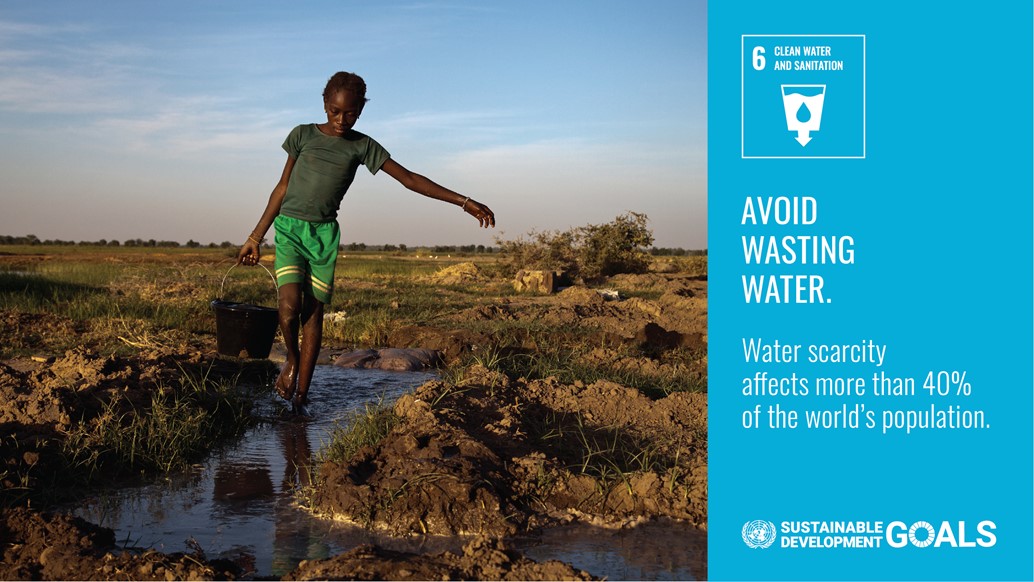
Further shocking statistics illustrate the scale of the challenges we face:
- 1 in 4 health care facilities lack basic water services[3]
- 3 in 10 people do not have access to safely managed drinking water services[4]
- 40% of the global population is affected by water scarcity[5]
- 4 billion people lack access to basic sanitation services, such as toilets or latrines[6]
- 80+% of wastewater resulting from human activities is discharged into rivers or sea without any pollution removal[7]
- 1,000 children die every day due to preventable water-related diarrheal diseases[8]
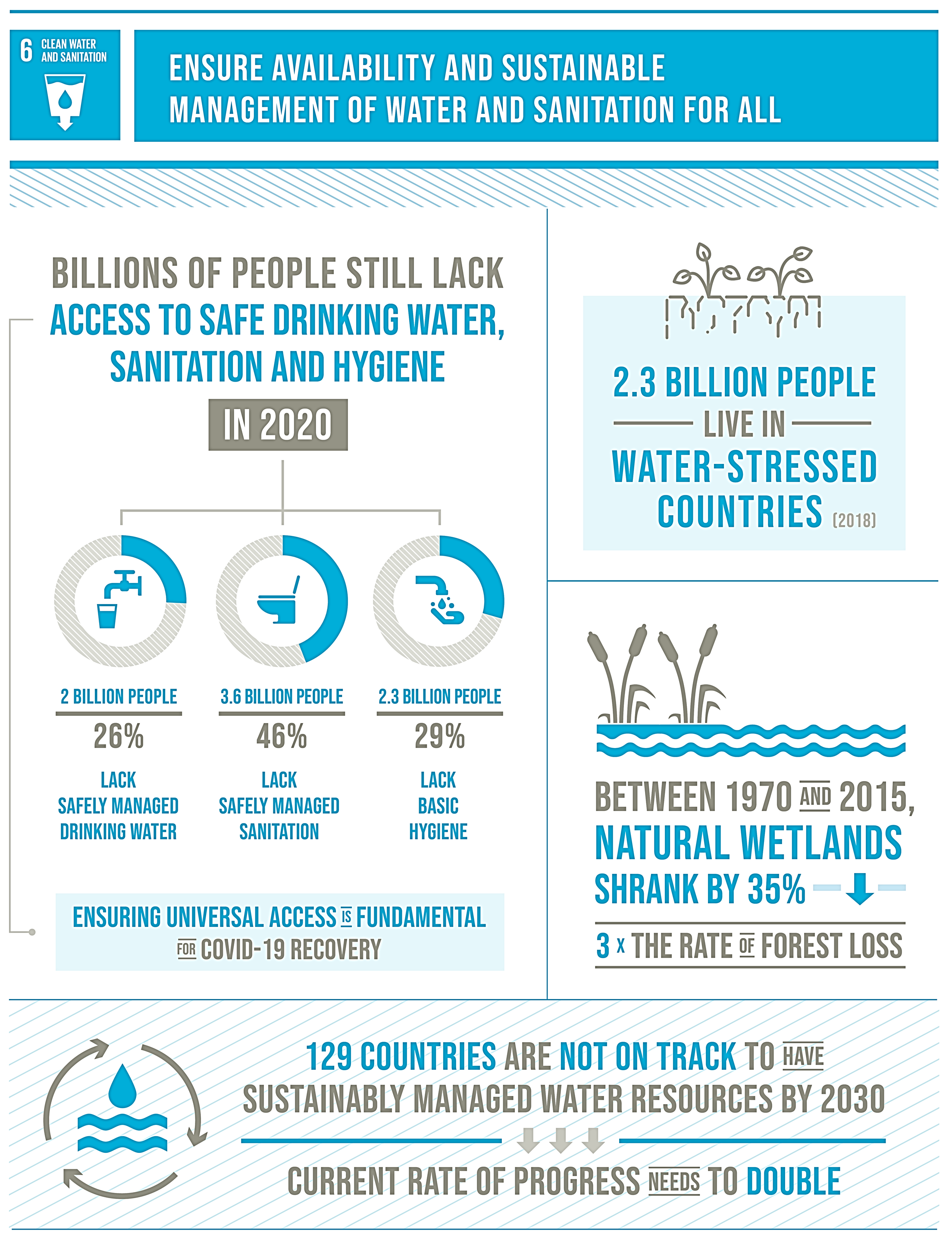 SDG 6 goes beyond drinking water, sanitation and hygiene to also address the quality and sustainability of water resources, such as oceans, lakes, rivers and aquifers, and the wider water-related eco-system.
SDG 6 goes beyond drinking water, sanitation and hygiene to also address the quality and sustainability of water resources, such as oceans, lakes, rivers and aquifers, and the wider water-related eco-system.
The natural environment – forests, soils and wetlands – is a major factor in water availability and water quality, strengthening the resilience of water resources and complementing investment in physical infrastructure.
Poor water availability weakens food security and reduces the income of rural farmers.
At the same time, improving water management strengthens the local economy and helps make the agriculture and food sectors more resilient and more flexible.
Gilbert Houngbo, UN-Water Chair and President of the International Fund for Agricultural Development, sums up the challenge thus:

“Making sure that there is water and sanitation for all people, for all purposes, by 2030 will help future-proof global society against the many and varied threats coming down the line. Our immediate, shared task is to establish safe water and sanitation services in homes, schools, workplaces and health care facilities. We must increase investment in water-use efficiency, wastewater treatment, and reuse, while financing the protection of water-related ecosystems. And we must integrate our approaches, with improved governance and coordination across sectors and geographical borders.”[9]
Long-term commitment
As long-term investors in the ‘infrastructure of life’ over the past 75 years, the Jameel Family has a long and proven commitment to helping address some of mankind’s biggest challenges, from hunger to education, poverty to health.
Water, too, continues to be a priority focus, reflecting the efforts of the UN on this vital issue.
Global consulting firm, McKinsey & Company, says that water is as important to the World’s economy as oil or data[10]. This may sound strange considering that water is the most abundant resource on the planet. But only 1% of it is fit for human consumption. 97% is seawater and a further 2% is locked up as ice or snow around the poles[11].
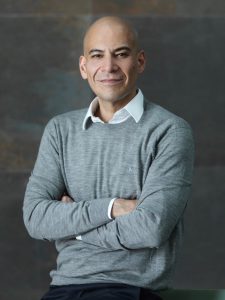
Deputy President & Vice Chairman,
Abdul Latif Jameel
This situation is made worse by the fact that demand for water far exceeds supply. By 2050, demand for water is expected to grow by more than 50% to feed an estimated 10 billion world population[12]. Climate change is poised to further stress this precious resource.
“It is ironic that in our world of vast water resources, only a tiny fraction is available to support life, while huge numbers of inhabitants lack enough water to live on, often due to our own mismanagement of resources,” said Fady Jameel, Deputy President and Vice Chairman, Abdul Latif Jameel.
One of the main solutions for increasing the amount of water for industrial, agricultural or domestic use is desalination: extracting the salt from seawater and making it suitable for human consumption and use.
Globally, more than 300 million people get their water from de-salination plants, according to the International Desalination Association. Many countries simply could not function without it. The Middle East accounts for just under half of total capacity, while Asia, China, the United States, and South America are scaling up their desalination capacity fast.
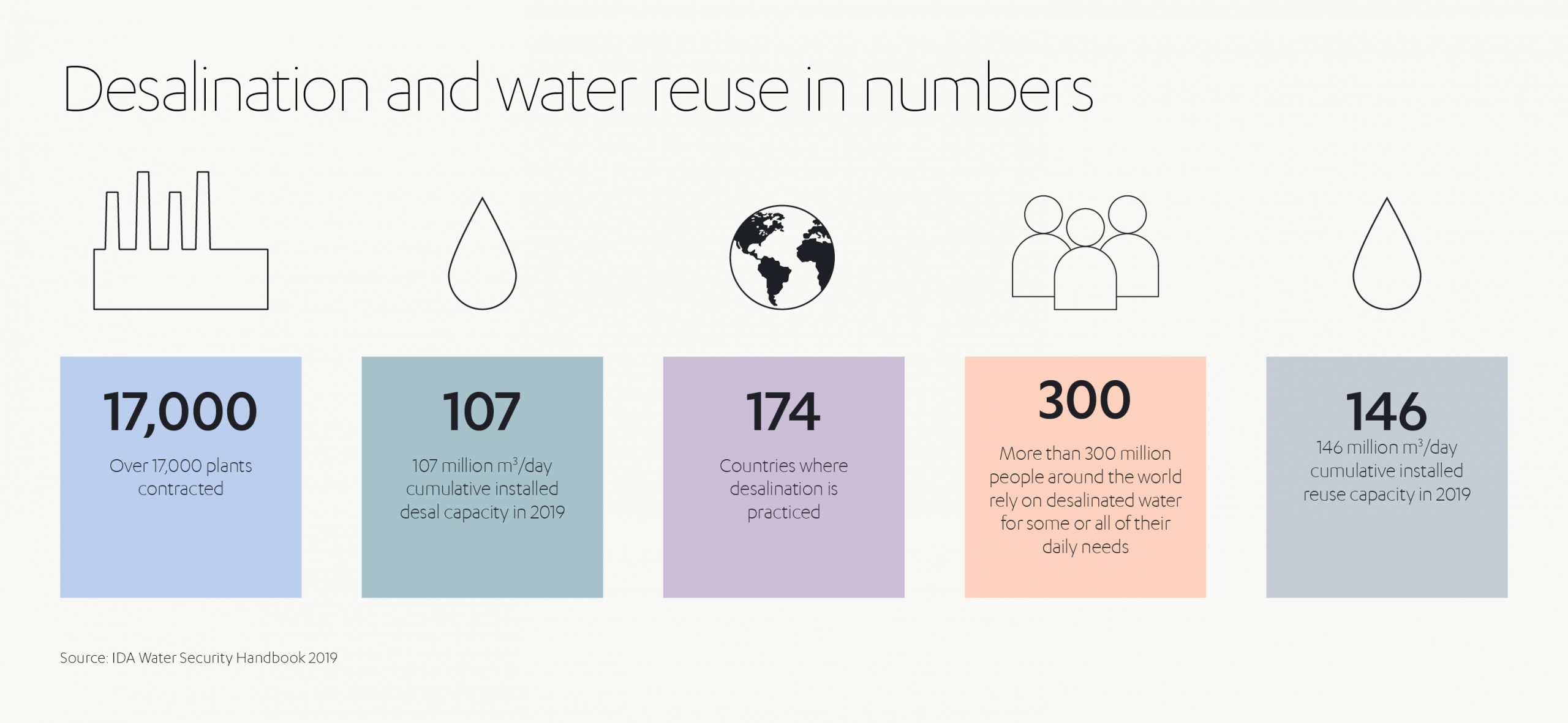
Almar forges ahead
Almar Water Solutions, part of Abdul Latif Jameel Energy and Environmental Services, is playing an increasingly significant role in the expansion of global desalination capacity on the journey towards SDG 6.
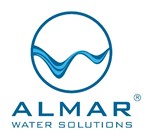 Almar Water Solutions, founded in 2016, is a specialist provider of technical capabilities for water infrastructure development. Its dedicated and experienced team draws on over two decades of worldwide experience in the industry and is today continuously working to develop integrated solutions to serve the growing needs of both municipal and industrial sectors.
Almar Water Solutions, founded in 2016, is a specialist provider of technical capabilities for water infrastructure development. Its dedicated and experienced team draws on over two decades of worldwide experience in the industry and is today continuously working to develop integrated solutions to serve the growing needs of both municipal and industrial sectors.
It is an ideal complement to Fotowatio Renewable Ventures (FRV), the flagship renewable energy business of Abdul Latif Jameel, providing technological tailored solutions developing desalination, water treatment, wastewater treatment and recycling plants across all major sectors of industry. This has included the award of a major contract in Saudi Arabia to develop the US$ 600 million Al Shuqaiq 3 IWP, one of the world’s largest reverse osmosis desalination plants (as part of a multinational consortium).
Situated near the Red Sea city of Al Shuqaiq, the Shuqaiq 3 IWP will cover the size of 34 soccer fields. Due for completion in autumn 2021, it will deliver 450,000 cubic meters of clean water each day on a 25-year build-own-operate scheme with SWPC. More than 1.8 million people will receive fresh water from the site, while 700 jobs will be created.
Also active in waste water management and sanitation, in May 2019, Almar Water acquired a major stake in the Muharraq plant in Bahrain, with a 29-year contract to operate the 100,000 cubic meter/day wastewater treatment plant and sewerage system. The plant includes the first 16.5 km deep main gravity collector in the Gulf region, along with a sewage collection network.
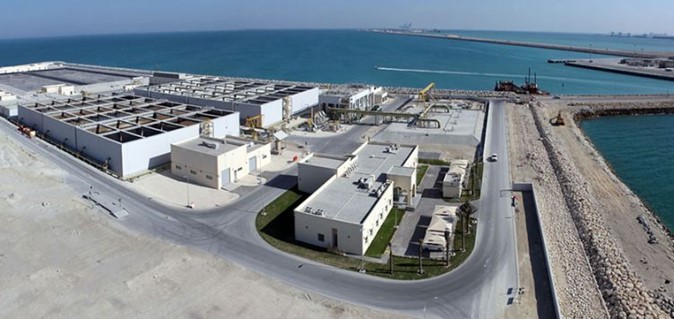
In addition, it established a joint venture with Hassan Allam Utilities in Egypt to form AA Water Developments, with the aim of revitalizing the country’s water infrastructure.
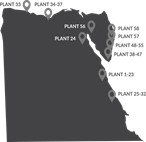
This led to the acquisition of Ridgewood Group in Egypt, a major desalination services company.
Ridgewood operates 58 desalination plants throughout the country, with the capacity to provide 82,440 cubic meters of safe, clean drinking water every day.
As well as its growing presence in the Middle East – one of the most water scarce regions in the world – Almar Water Solutions is expanding its presence in other key markets around the world.
This includes a regional platform for Latin America, another region suffering from water scarcity.
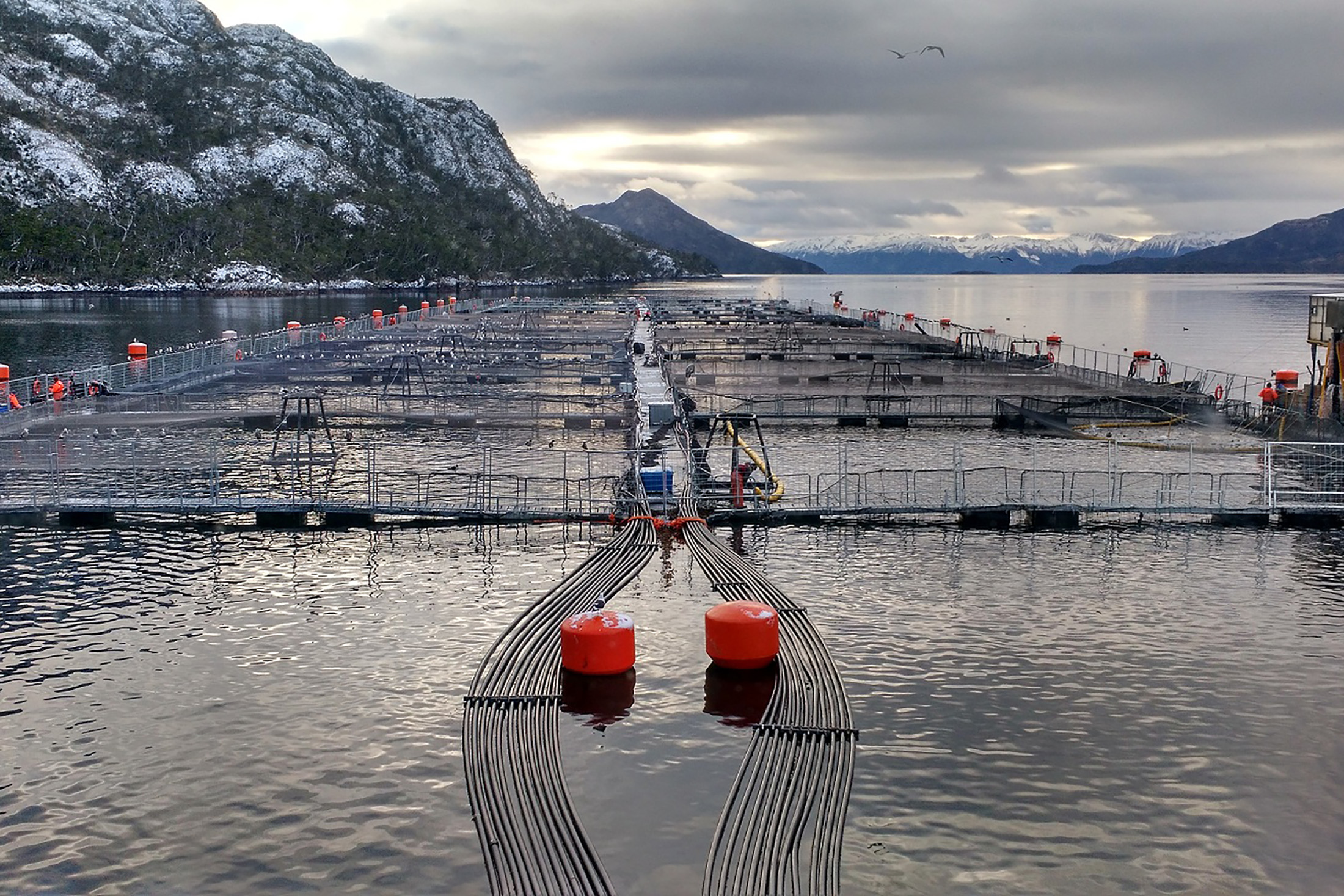
Novaustral wastewater treatment plant processes around 30 cubic meters/hour of liquid waste from a salmon farm. It has a capacity of 840 cubic meters/day and uses Induced Air Flotation (IAF) technology for its treatment. The system has been operated by the company since 2012 and is located in Punta Arenas, the southernmost region of Chile. This service is different due to the logistics involved in operating on an island, with freezing temperatures during 8 months of the year and winds reaching 80 km/h.
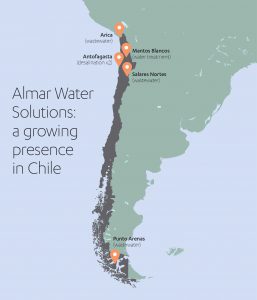 It acquired Chilean water treatment company Osmoflo SpA in 2019. In August 2020, Almar, via Osmoflo, won a three-year water services operation and maintenance contract for Chilean mining company Mantos Copper.
It acquired Chilean water treatment company Osmoflo SpA in 2019. In August 2020, Almar, via Osmoflo, won a three-year water services operation and maintenance contract for Chilean mining company Mantos Copper.
Almar will operate a water treatment plant for the company’s Mantos Blancos project in northern Chile. The plant will use reverse osmosis to produce water suitable for its mining operations in the area, helping to create more jobs and prosperity.
It is one of a number of projects Almar is involved in the country. Others include a wastewater treatment plant at Salares Nortes; two desalination plants at Antofagasta (Antucoya and Centinela Mining); a wastewater treatment plant in the northern port city of Arica, and another at Punto Arenas, in the southernmost region of Chile.
Most recently, doubling its presence in Chile, Almar Water acquired a 50% stake in Aguas y Riles SA as it continues to build-out its regional Latin American platform to address issues such as water availability and sanitation in these countries.
Pushing the boundaries of water-related research
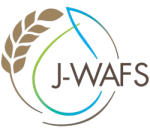 In addition to driving efficiency and growth in access to sustainable water solutions through the technical and operational expertise of Almar Water Solutions, the Jameel Family is also helping to push forward the boundaries of research and innovation in water technology through the Abdul Latif Jameel Water and Food Systems lab (J-WAFS), a Community Jameel cofounded initiative based at MIT.
In addition to driving efficiency and growth in access to sustainable water solutions through the technical and operational expertise of Almar Water Solutions, the Jameel Family is also helping to push forward the boundaries of research and innovation in water technology through the Abdul Latif Jameel Water and Food Systems lab (J-WAFS), a Community Jameel cofounded initiative based at MIT.
J-WAFS is based on the firm belief that research and innovation are essential to solving the problems of water scarcity, water quality, and water access. It is fueling research on sensors, purification, water use efficiency, and water production, distribution, and management, in order to find solutions to our current water challenges and to ensure clean and safe water for generations to come.
J-WAFS has so far supported over 200 researchers, 21 lab projects and four start-ups or products. Among its successes are a natural low-cost water filter made from xylem wood. When plants draw up water through their roots and take it into the leaf through their xylem tissue, it can cause bubbles in the water. To get rid of these bubbles, the plants have membranes in the xylem that filter them out. The J-WAFS team showed that these same xylem membrane structures can also be used to filter water and remove bacteria. They are using the same idea to design practical, effective domestic water filters based on xylem that would cost just a few cents.
Another J-WAFS project uses a new technology called Intelligent Selective Electrodialysis (ISED) to selectively remove from water the ions that plants don’t like, while keeping useful nutrients like calcium and magnesium. One of the lead researchers on the project, Kishor Govind Nayar, believe this new solution could save up to 25% in water consumption and 30% in fertilizer use, compared to traditional reverse osmosis.
Similarly, Professor Xuanhe Zhao, another J-WAFS researcher, and his team are developing a vibration-based membrane cleaning technology with the potential to improve the efficiency and working life of desalination membranes and reduce the costs of reverse osmosis.
The work of Almar Water Solutions and J-WAFS is just a small fraction of the commitment, investment and actions necessary to achieve the goals of the UN’s SDG 6 and secure access to the clean water and sanitation services that humanity depends on.
It is not beyond our capabilities, but only a coordinated and committed approach will stand any chance of success. Governments, international bodies, private sector, academic partners, communities – all must play a crucial role in tackling the water challenges facing our societies and building a more sustainable foundation on which our shared future can be built.
[1] Summary Progress Update 2021: SDG 6 — water and sanitation for all, United Nations, 21 February 2021
[2] Summary Progress Update 2021: SDG 6 — water and sanitation for all, United Nations, 21 February 2021
[3] https://apps.who.int/iris/bitstream/handle/10665/311620/9789241515504-eng.pdf
[4] https://weshare.unicef.org/Package/2AMZIFLEV3_N
[5] https://wedocs.unep.org/bitstream/handle/20.500.11822/25761/SDG6_Brief.pdf?sequence=1&isAllowed=y
[6] https://www.who.int/news-room/fact-sheets/detail/sanitation
[7] https://www.unwater.org/water-facts/quality-and-wastewater/
[8] https://www.unicef.org/media/media_21423.html
[9] Summary Progress Update 2021: SDG 6 — water and sanitation for all, United Nations, 21 February 2021
[10] http://www.mckinsey.com/business-functions/sustainability/our-insights/water-a-human-and-business-priority?cid=eml-web
[11] https://www.economist.com/special-report/2018/08/14/priceless





 1x
1x

 Added to press kit
Added to press kit


